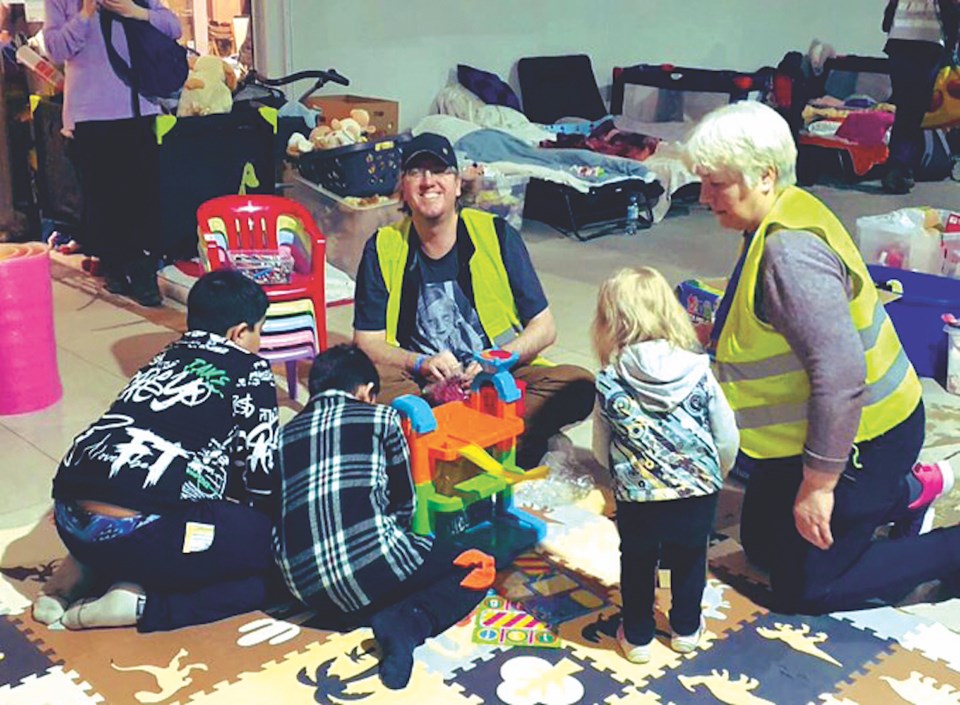When he was only four years old, Milos Pospisil and his family fled Russian-occupied Czechoslovakia for a better life.
The year was 1984. Now, nearly 40 years later, Pospisil is helping other refugees escape the Russian forces in Ukraine.
“My birth country is only a stone’s throw away from Ukraine,” Pospisil told Coast Reporter on March 23, from a refugee centre near the border in Przemysl, Poland. “If we don’t do enough now, then Europe is at serious risk of more violence and invasion.”
Pospisil raised nearly $9,000 to go towards the effort and donations. Even before the invasion of Ukraine, Pospisil had been providing support to non-lethal efforts of volunteer battalions, and keeping a wary eye on Russia’s foreign policy and increasingly aggressive actions in Georgia, then Chechnya, Crimea and parts of Ukraine.
From Gibsons to Poland
On March 10, Pospisil left his home in Gibsons to fly to Poland. For two weeks, he helped Ukrainians in any way he could without military training: sorting donations, loading trucks to Kyiv, restocking supplies and evacuating vulnerable families in a rental van. As of March 23, he’d taken six families to Warsaw or the Ostrava area of the Czech Republic, travelling up to 1,000 kilometres each day. His passengers were parents with children and the elderly from some of the most hard-hit parts of Ukraine – those who were the most vulnerable to the threat of human trafficking lurking at the border.
At the border, people are cold, confused, traumatized. “They may have been waiting to cross for days, exposed in the weather. And the minute they cross the border, there are human traffickers waiting and descending on these young women, and then even the children,” Pospisil said.
There’s not much law enforcement there able to handle the number of people. With every group of passengers, Pospisil tried to make them as comfortable as possible, filling the van with pillows and blankets, water bottles and fresh fruits and chocolate. For the children, he’d give them a new toy or colouring book – something to make them feel like a kid again.
“They’re dealing with such an intense level of trauma that I’m just trying to make them feel better. Calm them down and make them feel safe,” he said. “I really tried to treat them like a first-class chauffeur.”
A place to play in a refugee centre
Between trips, Pospisil would help out at a refugee centre, tracking down what they needed from baby supplies to healthy ingredients for food. On Pospisil’s yellow vest, he wrote down the languages he can speak: English, French, Czech, Slovak and basic Russian.One act Pospisil is most proud of, he said, was creating a play area and baby care station in the mother and baby room at the centre. He purchased supplies, soft mats and toys to create a clean safe space for the youngest of the refugees “so they wouldn’t have to be in this dark room, stuck in their trauma.”Many Ukrainians don’t want to go far from the border, Pospisil said. Many are in denial that they won’t be able to return home.
“They’ve been violently driven from their homes and their lives,” he said. “Ukrainians are exceptionally proud people and they love their country. They don’t want to leave. It’s hard to convince them that they need to seek more stable arrangements for the foreseeable future.”
'At least I can help ease the suffering’ As he prepares to return to Canada, Pospisil said he feels a strong sense of accomplishment and of guilt.
“I was able to fight this war my way in that I was able to do something. If I can’t pick up a gun and fight the Russians head on, which is what I really wanted to do, at least I can help ease the suffering, get these people to safety,” he said. “Every family I drive is a family that’s safe from human traffickers. I keep telling myself that and that kept me going.”
But people continue to cross the border and continue to need help. “It feels neverending.” Pospisil wants to stay and continue to help, but he has his own family to care for at home and bills to pay. He may come back and turn what he’s learned into action once more, perhaps to help rebuild when the time comes.
“They are fighting for all of us. It’s not just about Ukraine. They’re fighting for their rights for self-determination. Freedom,” he said. “And they’re giving their lives for the values that we have.”
How you can help
Pospisil recommended several ways people can help from the Sunshine Coast:
- Donate to a trusted organization like the World Central Kitchen (wck.org) or the Red Cross.
- Write to your Member of Parliament or government representative to push for a more effective refugee intake program and supports.
- Coasters are also uniting to provide aid to those affected by the Russian invasion of Ukraine in a number of ways. From fundraisers, to donation organizers, to housing, here are a few ways you can help:
- Gibsons’ Judy Rother is putting together a list of people on the Coast who have accommodation and could take in refugees on a short-term or long-term basis. Email her at [email protected].
- Sandra Robinson of Sandy Hook created a Facebook group “Helping Ukrainians Come to Sunshine Coast BC” to find and share information, where Coasters can offer help.



